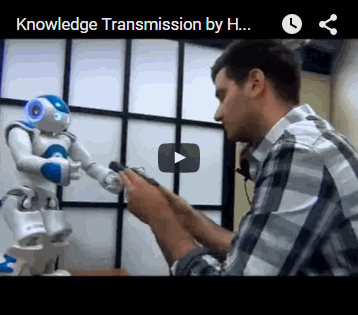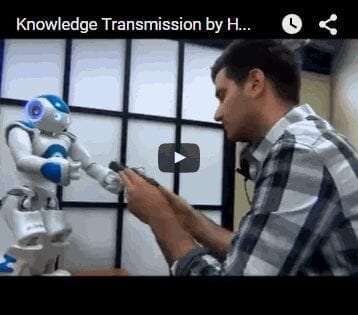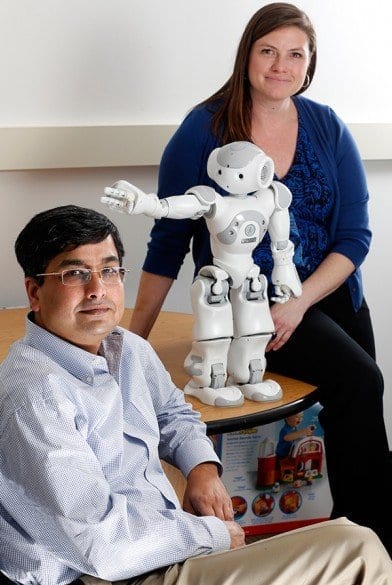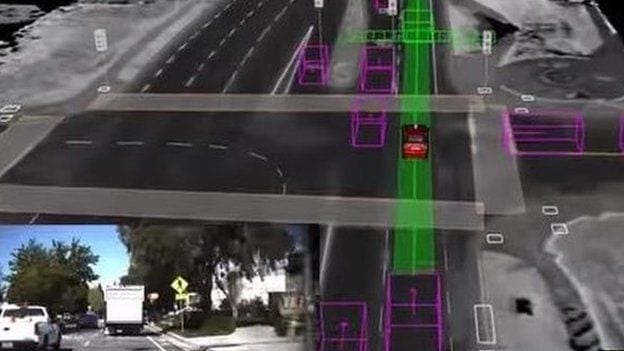
A team of French researchers from the Institut cellule souche et cerveau (Inserm/Université Claude Bernard Lyon 1), led by CNRS senior researcher Peter Ford Dominey, has developed “an autobiographical memory” for the robot Nao, which enables it to pass on knowledge learnt from humans to other, less knowledgable humans.
This technological progress could notably be used for operations on the International Space Station, where the robot, which is the only permanent member, would liaise between the different crews that change every six months in order to pass on information. These results will be presented at the 24th International Symposium on Robot and Human Interactive Communication, on September 3, 2015 in Kobe, Japan.
Human culture stems from knowledge acquired through society’s shared experience. Cultural transmission enables new members of society to quickly learn from this accumulated experience. In order for a robot to understand cooperative behavior, which is necessary for the cultural transmission of knowledge, researchers developed a system whereby a human agent can teach the Nao humanoid new actions through physical demonstration (by putting the robot’s members in the correct position), visual imitation (through the Kinect system), or voice command. These individual actions are then combined into procedures and stored in the robot’s autobiographical memory developed by researchers, thus enabling the robot to reproduce them for other human agents if needed.
Researchers set up this autobiographical memory system to meet the challenge of cooperation between humans and robots, which is becoming more and more of a reality in the field of space operations, with the humanoid Robonaut 22 now permanently flying aboard the International Space Station.
To test their system, the scientists imagined a scenario that could occur on the International Space Station. The transmission of information on board is essential, since crews change every six months. In this scenario, an electronic card is damaged. Nao plays the role of the scientist’s assistant by following his directions, bringing or holding parts of the card during repair. If this same failure happens again, the memory of this event will enable the robot to use a video system to show the repair that was made to a new member of the crew. It could also respond to questions regarding the previous event, while helping with the new repair. If a slightly different failure takes place, the robot could share its expertise on failures of this type, while recording the steps needed to resolve this new problem and then transferring them to the scientists in the next crew.
Read more: A humanoid robot to liaise between space station crews
The Latest on: Autobiographical memory
[google_news title=”” keyword=”Autobiographical memory” num_posts=”10″ blurb_length=”0″ show_thumb=”left”]
via Google News
The Latest on: Autobiographical memory
- More People Have Walked On The Moon Than Done These 44 Thingson May 8, 2024 at 2:07 am
Just tune in to the Olympic Games this summer and count the times you will hear the phrase "It's never been done before!" Wishing to explore this topic further, Reddit user Anonburrsir asked everyone ...
- Building Your Life Story, One Memory at a Timeon April 17, 2024 at 5:25 pm
Autobiographical memory, or your recall of events from your life, is a part and parcel of your sense of identity. The experiences you’ve had up to the present time shape your ideas about ...
- Aphantasia: What we’ve learned about people who can't “visualize” informationon March 29, 2024 at 9:25 pm
One of the most striking findings from the research is the connection between aphantasia and autobiographical memory. People who cannot conjure up mental images are less likely to vividly remember ...
- Clinical Perspectives on Autobiographical Memoryon January 12, 2024 at 5:33 pm
Autobiographical memory plays a key role in psychological well-being, and the field has been investigated from multiple perspectives for over thirty years. One large body of research has examined the ...
- The ‘Mandela Effect:’ A Psychologist Explains Collective False Memorieson November 24, 2023 at 2:26 pm
This interconnection encompasses our episodic memory, autobiographical memory and our portion of self-concept that guides information processing—or the “working self.” The researchers ...
- Autobiographical Memoryon July 23, 2023 at 11:24 am
Autobiographical memory is the basis for most psychotherapies, an important repository of legal, historical, and literary information, and, in some views, the source of the concept of self. When it ...
- Personal Memories and Nostalgiaon October 2, 2020 at 2:48 pm
Autobiographical memory is a broad category of memories related to a person’s own life. This complex body of information can range from basic details about one’s past to vivid impressions of ...
- Total recall: some people can remember every day like it was yesterdayon August 13, 2020 at 4:56 pm
Teenager Tyler Hickenbottom has a rare condition known as ‘HSAM’ (Highly Superior Autobiographical Memory) and is featured in The Memory Mirage. It allows him to remember every day of his life ...
- Photographic memoryon July 6, 2019 at 7:03 pm
And some people do have better visual memory than others. Highly Superior Autobiographical Memory (HSAM) is a condition that has been identified in fewer than 100 people worldwide. People with ...
- How does my memory measure up?on March 20, 2019 at 10:04 am
An interactive guide exploring the human hard drive. Whether it’s remembering our route to work, finding the keys we just put down or making sure that birthday card is posted, we all rely on our ...
via Bing News











